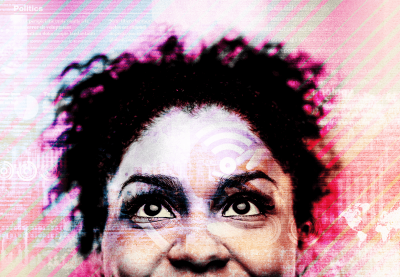Coming Soon
New episodes are on the way soon. While we're taking a short winter break, get a sneak peek at what's coming up while you catch up with the rest of our family of podcasts.
Transcript
Monita Bell: Hey, it’s Monita Bell, your host for The Mind Online, and I can’t thank you enough for tuning in and learning with me. I’m also so grateful for the supportive and affirming tweets and emails, and I’m glad you’re finding this podcast valuable and meaningful to your practice. That’s why we’re doing it.
I’m here to let you know that we’re going to be taking a little winter break, but we will be back in early spring with more vital information for you and your students. If you haven’t yet listened to the first six episodes, do it!
We’ve talked about the differences and similarities between media literacy and digital literacy and the role our brains play in how we process and interpret information we see online. In an episode that’s gotten a lot of feedback, “Did You Google It?,” we get into the fact that, yes, mainstream search engines are first and foremost advertising platforms, which is a key reason why racist and hateful materials rise to the top of identity-related search results.
And when it comes to hate, white nationalists have made comfortable homes on the web. We talked in depth about that in our latest episode, “Media Manipulation.”
But two significant threads have run throughout all of the conversations I’ve had with my guests so far: critical thinking and youth empowerment.
“Critical thinking” is one of those terms we’ve really begun to take for granted, but when so many people—and that’s kids and adults—can’t distinguish between real and fake news stories, we need to get back to basics.
We also need to understand the primacy of digital media in young people’s lives. As we discussed in episode 5, “Digital Literacy and Youth Civic Engagement,” young folks are already using digital media and other technologies. Educators are in an excellent position to help guide them in using those platforms to organize and advocate for the issues they care about.
So if you’ve missed any of that, go back and check it out. And here’s a little taste of what’s to come!
We’ve got an episode dedicated to librarians and the unique role they play in digital literacy instruction. They have expertise—use it! We’re also going to be digging much deeper into the ins and outs of social media, YouTube and gaming platforms. Spoiler alert: there’s a lot of hate going on in those spaces too. But there’s also a lot of good.
And that’s why I’m very excited about our forthcoming episode on digital activism. As digital media continues to grow, so do the opportunities to amplify voices for necessary change.
If you’re learning from this podcast, I hope you’ll share it with your friends and colleagues. And please do us a favor and rate, review and subscribe to The Mind Online wherever you get your podcasts so that more people can find us and dig into this important content.
While you wait for new episodes, I want to remind you to check out Teaching Tolerance’s other podcasts, Queer America and Teaching Hard History: American Slavery. The new, mini-season of Teaching Hard History is available now. Make sure you tune in! You can listen at tolerance.org/podcasts or wherever you listen.
Also, we want to know more about you … and how you’re using this podcast. What are we doing that’s useful? And how can we do a better job to help you in the classroom? So do me a favor: Spend a few minutes and take our very short listener survey at tolerance.org/podcasts.
Talk with you soon.
